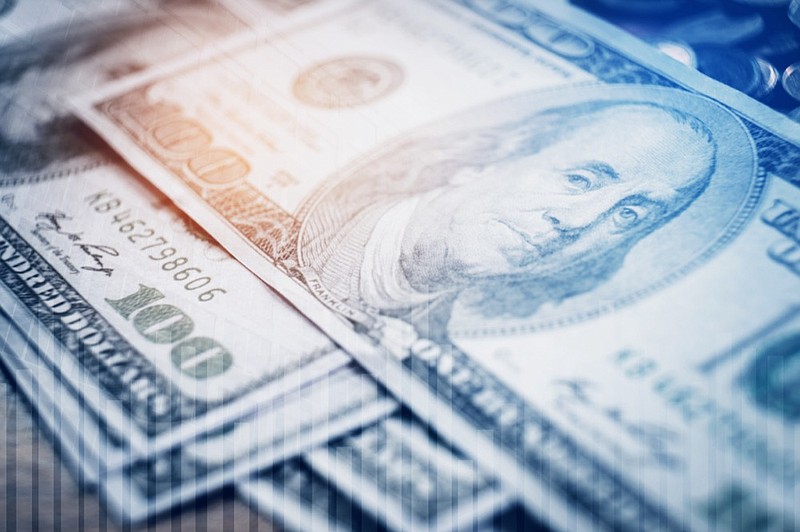For the past 75 years, the U.S. dollar has enjoyed a unique status as the preeminent global currency. Used broadly in international commerce and widely held by sovereign governments, the Greenback remains by far the most important currency and as such conveys special benefits to the American economy. But nothing is constant, and a confluence of structural changes internationally and U.S. policy errors is calling into question the sustainability of the dollar's rule, with potentially profound implications.
The United States emerged from World War II as the dominant power, and institutionalized its hegemony in a new global financial and currency system agreed to by the victorious nations at a conference in Bretton Woods, New Hampshire. The Bretton Woods Agreement of 1944 created the World Bank and the International Monetary fund, and established the U.S. dollar as the essential currency of international exchange and trade. This special status was derisively dubbed the "exorbitant privilege" by the French Finance Minister in 1960. But this privileged role has allowed the United States to finance its massive debt without serious negative impact and has contributed to improved standard of living and higher real incomes for average Americans, at the expense to some degree of the rest of the world.
Now the world is changing. The United States comprised 40% of global GDP in 1960; today it makes up 25%. China is steadily ascending, now accounting for 15% of the world economy and growing more rapidly, while the European Union roughly equals the U.S. in output. Pressure is mounting from our economic competitors to reduce the dollar's dominance in exchange and trade transactions and reserve holdings by foreign governments.
As the size of the American economy declines relative to other major players, structural changes are afoot as well. China has been aggressively modernizing its antiquated banking system and has taken a lead in alternative payment processing, essentially leaping directly from cash to mobile payments (credit cards never really gained a foothold in China). In addition, China has launched the world's first central bank backed cryptocurrency, the e-RMB, which it hopes will eventually displace some dollar transactions.
The vast majority of the world's oil trade is conducted in U.S. dollars, but that may be changing too. In 2018, China began buying some of its massive oil imports in its own currency, the Yuan. Meanwhile, Russia is working to reduce its dollar reserve holdings and has increased its own stockpile of Chinese Yuan. And Russia is now China's largest oil supplier.
Perhaps as important as sheer economic size, a currency's reserve status depends upon the perception of stability and trust afforded to the issuing country. Modern currencies are no longer backed by hard assets like gold, but derive value only by "fiat" based on confidence in the issuer. In this regard, the United States has taken actions that are puzzlingly detrimental to confidence in the dollar.
President Trump did not create the disturbing trend toward nationalism and protectionist isolation, but his administration has compounded the damage. Beginning with United States withdrawal from the Trans Pacific Trade deal and continuing with a trade war and increased bellicosity toward other nations, global supply chains are shifting and adjusting to the new reality, potentially reducing dependence on the dollar as bilateral trade in other currencies increases.
Furthermore, recall that the reserve status of the dollar depends upon our perceived stability and trustworthiness in the eyes of our trading partners. Clearly, we have forfeited much of that confidence and to some degree abdicated our global leadership in recent years. A reserve currency depends upon trust, and trust in the United States is presently diminished. China in particular is stepping into the breach.
The exorbitant privilege has allowed America to finance its enormous debt with relatively little adverse impact. It is easy to issue large amounts of debt when the world clamors for your currency and you have the ability always to print more. The loss of reserve status would change that. First, the dollar would devalue, sparking price inflation and a decline in real incomes for Americans and higher interest rates for home and car loans. But more painfully, the cost of financing our debt will soar as demand for U.S. Treasury Bonds dwindles, forcing us to pay ever higher rates in order to attract buyers. With the national debt on a 5-year pace to reach $30 trillion and limited ability to print money, the longer term implications are staggering.
A major shift away from the dollar is not imminent, as there are currently no viable options. China must implement significant legal protections and market reforms before the Yuan becomes a competitor, and most other currencies are simply too small. But absent a reexamination of American policy and priorities and the restoration of American leadership, the direction of the trend is not promising.
Christopher A. Hopkins, CFA, is a vice president and portfolio manager for Barnett & Co. in Chattanooga
